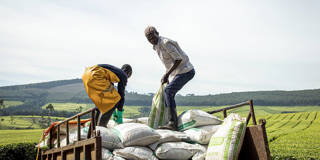Amid the war in Ukraine, surging inflation, and an appreciating US dollar, many African countries are struggling to keep up with the rising costs of food imports. By increasing the production of fertilizers and wheat, the continent can strengthen its resilience to external shocks and feed much of the world’s population.
CAIRO – Despite containing 60% of the world’s uncultivated arable land, Africa has been a net food importer for decades. According to the most recent estimates, food imports are the biggest budget item for many countries across the continent. Amid surging food prices and an appreciating US dollar, Africa’s food bill has soared as well, undermining African countries’ economic growth, debt sustainability, and political stability.
According to the Brookings Institution, Africa spent around $43 billion on food imports in 2019. Due to the current inflationary environment, most recent estimates are probably higher, especially in a region where high import dependence exacerbates the pass-through from global to local food prices. The soaring dollar, driven by the Federal Reserve’s interest-rate hikes, has depleted African countries’ hard-earned foreign-exchange reserves and led to sharp increases in their debt-servicing costs, heightening the risk of a continent-wide insolvency crisis.
At the same time, the supply-chain disruptions caused by the COVID-19 pandemic and exacerbated by the war in Ukraine have highlighted the potential costs of Africa’s reliance on food imports. Food security is, after all, national security. African countries have learned this the hard way over the past two and a half years, as supply-chain bottlenecks and protectionist policies have reduced access to key agricultural commodities and led to dramatic price increases.

CAIRO – Despite containing 60% of the world’s uncultivated arable land, Africa has been a net food importer for decades. According to the most recent estimates, food imports are the biggest budget item for many countries across the continent. Amid surging food prices and an appreciating US dollar, Africa’s food bill has soared as well, undermining African countries’ economic growth, debt sustainability, and political stability.
According to the Brookings Institution, Africa spent around $43 billion on food imports in 2019. Due to the current inflationary environment, most recent estimates are probably higher, especially in a region where high import dependence exacerbates the pass-through from global to local food prices. The soaring dollar, driven by the Federal Reserve’s interest-rate hikes, has depleted African countries’ hard-earned foreign-exchange reserves and led to sharp increases in their debt-servicing costs, heightening the risk of a continent-wide insolvency crisis.
At the same time, the supply-chain disruptions caused by the COVID-19 pandemic and exacerbated by the war in Ukraine have highlighted the potential costs of Africa’s reliance on food imports. Food security is, after all, national security. African countries have learned this the hard way over the past two and a half years, as supply-chain bottlenecks and protectionist policies have reduced access to key agricultural commodities and led to dramatic price increases.